-
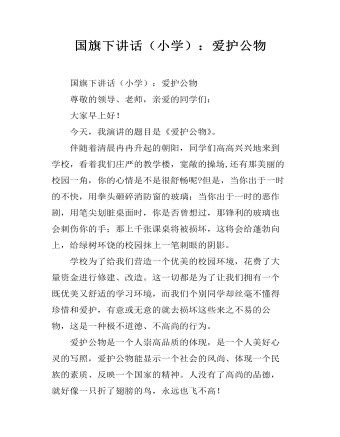
国旗下讲话(小学):爱护公物
尊敬的领导、老师,亲爱的同学们:大家早上好!今天,我演讲的题目是《爱护公物》。伴随着清晨冉冉升起的朝阳,同学们高高兴兴地来到学校,看着我们庄严的教学楼,宽敞的操场,还有那美丽的校园一角,你的心情是不是很舒畅呢?但是,当你出于一时的不快,用拳头砸碎消防窗的玻璃;当你出于一时的恶作剧,用笔尖划脏桌面时,你是否曾想过,那锋利的玻璃也会刺伤你的手;那上千张课桌将被损坏,这将会给蓬勃向上,给绿树环饶的校园抹上一笔刺眼的阴影。学校为了给我们营造一个优美的校园环境,花费了大量资金进行修建、改造。这一切都是为了让我们拥有一个既优美又舒适的学习环境,而我们个别同学却丝毫不懂得珍惜和爱护,有意或无意的就去损坏这些来之不易的公物,这是一种极不道德、不高尚的行为。

XX小学暑假安全教育国旗下讲话
各位老师,亲爱的同学们,大家好!紧张的一个学期接近尾声了,我们又迎来了盼望已久的暑假。怎样过好这个长假呢?我们有太多的设想与计划,我们有太多的欣喜与希望。可是,这一切,都是建立在安全的基础上的。因此在假期中,我们每一个同学都必须提高安全意识,学会自我保护。今天,我在这里要再三重申和提醒大家:安全是生命之水,文明是幸福之源!假期一定注意安全,希望大家不仅要记在脑子里,更要落实到行动上。希望同学们从以下几个方面做起:1、防溺水事故:溺水事故是夏季在安全方面存在的隐患,因为每年在这个季节里我们的周围都会发生许许多多令人惨痛的事故和教训,并且这些教训往往是以生命的失去而作为代价的;而对于一个家庭来讲,孩子生命的失去往往就意味着一个幸福家庭的破裂甚至毁灭。今天,我再次重申,绝对禁止到危险水域玩水。由于天气炎热,这个问题最容易出现,请同学们务必引起注意,坚决做到不在水库或深水区玩耍;不准与同学结伴到无安全设施、不熟悉,无救护人员的水域游泳。游泳时一定要有家长的陪同。

(小学)国旗下讲话:《双手创幸福》
就这样,寒号鸟每晚都在立志,白天又不去劳动,一个冬天过去了,窝始终没有建起来,最终冻死在岩石缝里。这则寓言告诉我们,劳动是生活的基础,是幸福的。人生中,既要有仰望星空的志向,更要付诸脚踏实地的劳动。同学们,让我们用双手创造幸福,用劳动践行理想吧!谢谢大家!
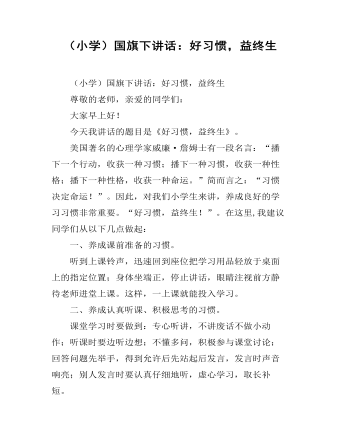
(小学)国旗下讲话:好习惯,益终生
三、养成预习、复习的习惯。每天都要把学过的知识复习巩固,还要对明天要学习的内容进行预习,把不懂的问题记下来。四、养成独立作业与检查订正的习惯。尽量在一个安静的环境中积极独立思考,完成作业。做好后仔细检查;作业本发下后发现答错题自觉及时地订正。五、养成课外阅读习惯。课外多阅读,可以开拓视野,丰富知识,提高表达与写作能力。如果你养成了以上的学习习惯,每天一定会有新的收获!同学们,让我们从现在做起,从点滴做起,不断坚持,逐渐养成良好的学习习惯,做一名勤学、乐学、善学的好学生!谢谢大家!
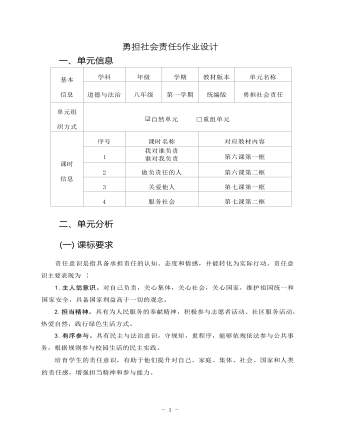
道德与法治八年级上册勇担社会责任5作业设计
(一) 课标要求责任意识是指具备承担责任的认知、态度和情感,并能转化为实际行动。责任意 识主要表现为 ∶1.主人翁意识。对自己负责,关心集体,关心社会,关心国家,维护祖国统一和 国家安全,具备国家利益高于一切的观念。2.担当精神。具有为人民服务的奉献精神,积极参与志愿者活动、社区服务活动, 热爱自然,践行绿色生活方式。3.有序参与。具有民主与法治意识,守规矩,重程序,能够依规依法参与公共事务,根据规则参与校园生活的民主实践。培育学生的责任意识,有助于他们提升对自己、家庭、集体、社会、国家和人类 的责任感,增强担当精神和参与能力。学生能够关心集体、社会和国家,具有主人翁意识、责任感和集体主义精神,主 动承担对自己、家庭、学校和社会的责任, 自觉维护祖国统一和国家安全;能够主动 参与志愿者活动、社区服务活动,具有为人民服务的奉献精神,勇于担当;能够遵守 社会规则和社会公德,依法依规有序参与公共事务,具有公共意识和公共精神;敬畏 自然,保护环境,形成人与自然生命共同体意识。
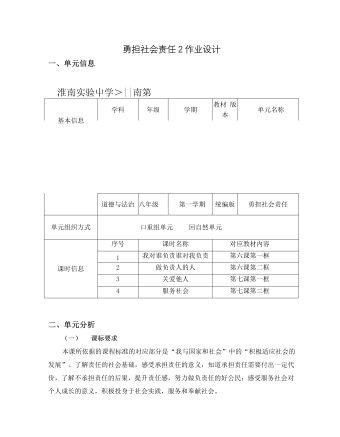
道德与法治八年级上册勇担社会责任2作业设计
一、单项选择题1. 假如你选择当一名教师,那便意味着你要教书育人;假如你选择做一名军人,那便意味着你要保家卫国;假如……这说明( )A. 我们可以根据需要选择承担或不承担责任B. 不同的角色要求承担不同的责任C. 责任对于每个人都是负担D. 每个人都应该承担相同的责任2. 芝加哥自然历史博物馆的卡尔?施密特在观察一条毒蛇时,突然遭其袭击,他顿时感到头晕,想要打电话,却发现电话坏了。他知道自己一定会死,但他坐 在桌前,记录自己死前的感受。卡尔在生命最后一刻默默守着工作岗位的举动, 表明( )A. 一个人无论什么时期都应对自己的一生负责B. 每个人在一生中所担负的责任往往是多重的C. 有知识和能力才能为社会贡献他的聪明才智D. 勇敢地承担责任首先要有强烈的责任意识

人教版新目标初中英语七年级下册How was your weekend教案2篇
Teaching Goal:1. General aims:Talk about recent past events2. Particular aims:A. Language Focus.Talk about recent past events and think of the past events.B. Language goalsHow was….?It was …What did …do over the weekend?C. Language structures:(1). How was your weekend? I was great. Pay attention to no form.(2). What did you do over the weekend? I played soccer. We went to the beach.D. Useful words and phrases:Words: was, did, went, beach, over, project, test, wasn’t, false, number, geography, spend, week, most, mixture, their, had, little, cook, read, saw, change, everyone, sit, sat, no, anythingPhrases: did one’s homework, played soccer, cleaned my room, went to the beach, played tennis, went to the movies, on Saturday morning, over the weekend, cook … for, what about, do some reading, have a party, talk show, go shoppingE. Grammar language:Present simple past tenseRegular and irregular verbsF. Learning strategies:Tour and holidaysG. Interdiscipinary:H. Emotion and manner:Teaching time: 5 periodsTeaching procedures:Period One教学步骤、时间 教师活动 学生活动 媒体应用Step 1Free talk 3’ Ask some questions like:Who’s on duty today?What’s the weather like? Answer and talk about something.让同学们回答下列问题1. Do you like weekend? (Let some students answer)It takes them three minutes to talk about the question.2. Why do you like weekend? (let the students answer) Most of the students like the weekend此时教师用汉语问:“在周末期间问你干了什么?这句话用英语这么回答?Let the students guess.At last the teacher give them right answer3. What did you do over the weekend?(板书、学习)

人教版新目标初中英语七年级下册Where is the post office教案2篇
Period 2 (3a----Section B 2c)Preview(Pre-task): Key points: What laAdd another information about their pen pals----their language on the cardnguage does she/he speak?She/He speaks....Does she/he have any brothers and sisters? Does she/he speak English?Preview(Pre-task): Add another information about their pen pals----their language on the cardKey points: What language does she/he speak?She/He speaks....Does she/he have any brothers and sisters? Does she/he speak English?Step 1 Revision1.Revisionand dictation of the new words 2.Revise the drills they learned yesterday.(by pairwork and grammar exercise)Step 2 Leading-inT has a conversation with one student. The conversation is following:---Do you have a pen pal?---Yes, I do.---What's your pen pal's name? ---His/Her name is....---Where is your pen pal from? ---He/She is from...---Where does he/she live? ---He/She lives in....---What language does he/she speak?He/She speaks...Write the new words on the Bb. They are following: EnglishChineseJapaneseFrenchStep 3 LearnLearn the new words with the whole class.Finish 3a with the students3b Pairwork T still does an example with one student Then the Ss practise in pairs. The example is following:--Curry Muray is my pen pal. He is from the United States.---What language does he speak?
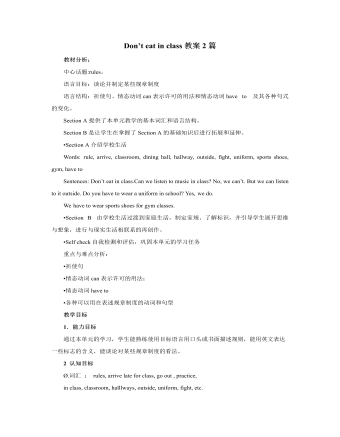
人教版新目标初中英语七年级下册Don’t eat in class教案2篇
Don’t fight. =You can’t fight. (板书,教读)教师把这些句子板书在黑板上,并请学生大声整齐地读祈使句和“can’t”句型,并让学生注意两种句型表达形式的不同和转换,“Don’t …=You can’t…”;并对学生说:These are our school rules. (板书,教读) You can’t break the school rules. Don’t break the school rules.(板书,教读)步骤3 :Practicea. T: Now, each of the students is breaking one of these rules.Please finish 1a.学生看图,完成1a的内容,检查答案并大声朗读校规。b. 听录音,完成1b,选出四位学生都违反了哪条校规;听之前,学生要读会英文名。c. 请两位学生朗读1c部分的句型;要求学生两人一组对话表演,SA扮演外校转来新生,SB告知本校校规。(学生可经过讨论,多说出他们想到的校规,不必只限于书上;教师应给予帮助)2) 第二课时(2a~4)步骤1 :warming up of revisionT: What are the rules at your school?学生使用“can”或祈使句表达各条校规;其中老师可引出“eat in the cafeteria outside”的表达。步骤2 :Practicea.T: Christina is an exchange student. She doesn’t know the rules. Let’s listen, what activities they’re talking about?学生听第一遍时,完成2a;第二遍时,完成2b;b. 请学生领读2c部分,看着2a完成的表格,理解2c活动的要求;分成小组针对2a进行问答;
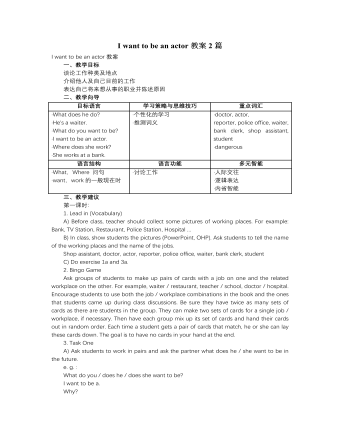
人教版新目标初中英语七年级下册I want to be an actor教案2篇
三、教学建议第一课时:1. Lead in (Vocabulary)A) Before class, teacher should collect some pictures of working places. For example: Bank, TV Station, Restaurant, Police Station, Hospital ...B) In class, show students the pictures (PowerPoint, OHP). Ask students to tell the name of the working places and the name of the jobs.Shop assistant, doctor, actor, reporter, police office, waiter, bank clerk, studentC) Do exercise 1a and 3a.2. Bingo GameAsk groups of students to make up pairs of cards with a job on one and the related workplace on the other. For example, waiter / restaurant, teacher / school, doctor / hospital. Encourage students to use both the job / workplace combinations in the book and the ones that students came up during class discussions. Be sure they have twice as many sets of cards as there are students in the group. They can make two sets of cards for a single job / workplace, if necessary. Then have each group mix up its set of cards and hand their cards out in random order. Each time a student gets a pair of cards that match, he or she can lay these cards down. The goal is to have no cards in your hand at the end.3. Task OneA) Ask students to work in pairs and ask the partner what does he / she want to be in the future.e. g. :What do you / does he / does she want to be?I want to be a.Why?Because it's (adj).B) Vocabulary: Section B, 1a4. Homework 1.2.
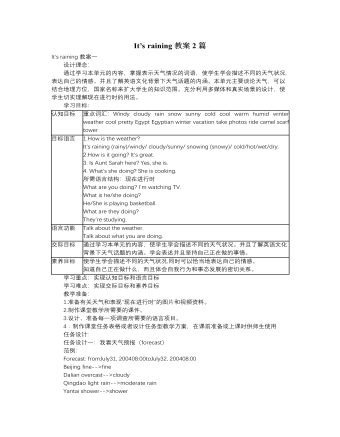
人教版新目标初中英语七年级下册It’s raining教案2篇
1 Each group choose one place to describe and what you are doing in it Choose one place, and describe what they are doing 2 Move around the room and give suggestions Talk about it and write it down 3 Ask one to show their works and act it Choose one of each group to make a report 4 Evaluate the best group and the best reporter Choose the best one Homework Ask your friends their ideal place and write about it教学反思:新课程标准中强调学生在课堂中的主体地位,在综合课中他们的主体地位就更加突出。在各个活动中给不同程度的学生不同层次的任务,让各层面的学生都有表现发挥的机会,从而产生对英语的兴趣。使用照片图片多媒体来辅助教学,效果更好。同时让了解其他国家风景,风俗的同学介绍ideal place,增加学生的背景知知识,实现跨学科交流的目的。教案点评:采用任务型教学模式,在各个活动中给不同程度的学生不同层次的任务,让各层面的学生都有表现发挥的机会,从而产生对英语的兴趣。使用照片图片多媒体来辅助教学,效果更好。让了解其他国家风景,风俗的同学介绍ideal place,增加学生的背景知识,实现跨学科交流的目的。
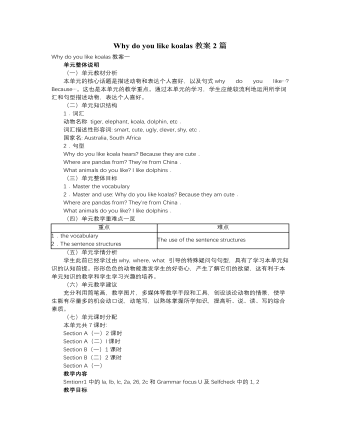
人教版新目标初中英语七年级下册Why do you like koalas教案2篇
单元整体说明(一)单元教材分析本单元的核心话题是描述动物和表达个人喜好,以及句式why do you like…? Because…。这也是本单元的教学重点。通过本单元的学习,学生应能较流利地运用所学词汇和句型描述动物,表达个人喜好。(二)单元知识结构1.词汇动物名称 tiger, elephant, koala, dolphin, etc.词汇描述性形容词: smart, cute, ugly, clever, shy, etc.国家名: Australia, South Africa2.句型Why do you like koala hears? Because they are cute.Where are pandas from? They're from China.What animals do you like? I like dolphins.(三)单元整体目标1.Master the vocabulary2.Master and use: Why do you like koalas? Because they am cute.Where are pandas from? They're from China.What animals do you like? I like dolphins.(四)单元教学重难点一览(五)单元学情分析学生此前已经学过由why, where, what 引导的特殊疑问句句型,具有了学习本单元知识的认知前提。形形色色的动物能激发学生的好奇心,产生了解它们的欲望,这有利于本单元知识的教学和学生学习兴趣的培养。
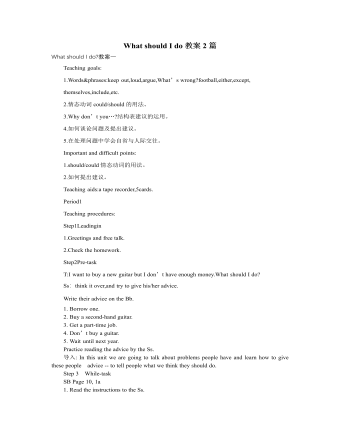
人教版新目标初中英语八年级下册What should I do教案2篇
说明:在帮Li Lei提建议的同时,教育学生如何学好英语。第三课时教学目标1. 语言目标:a) 词汇: Original, in style, haircut, the same as.b) 语言结构:My friend wears the same clothes and has the same haircut as I do.2. 能力目标:大多数学生能够谈论自己喜欢哪种服装,提高查找信息的能力。3. 情感目标:学会如何与朋友相处,要有自己对时尚的看法。教学重点掌握一些重要词汇。教学难点学会谈论问题,并能提出书面建议。◆教学突破首先针对Erin的问题,提出个人的建议,模仿2c部分的对话展开双人交际Pair-work;听老师诵读3a部分的信件,并找出LEFT OUT的问题所在;学生完成3b部分的内容,给Left Out提出书面的建议;学以口头形式提出自己目前存在的某个问题,讲给大家听,让同学们给自己提出一个建议,并作笔录;学生两、三个人分成一组,随意性地进行口语交际,谈论P14的第4部分的某个问题,相互交换意见。
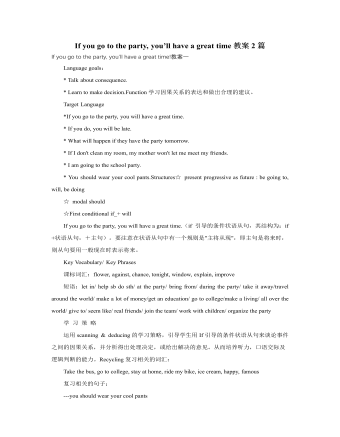
人教版新目标初中英语八年级下册If you go to the party, you’ll have a great time教案2篇
区分宾语从句、定于从句和状语从句宾语从句和状语从句,都叫做主从复合句。宾语从句主要是中考必考的,是初中阶段必掌握的从句,宾语从句主要是掌握三要素,所谓宾语从句,就是宾语在主从复合句当中充当宾语的一个句子,叫做宾语从句。主句的谓语动词是及物动词,后面如果是词或者是短语的话,是简单句,如果是句子的话,肯定是宾语从句。I know that he good at English.就是宾语从句,三要素,一要素是要注意连词,连词一共学了三类连词,一类连词是that口语当中可以省略,就像刚才说的那一句,I hear he is good at English.还有疑问代词、疑问副词,how where when,疑问代词、疑问副词。还有一类连词weather是否的意思,不是状语从句当中的如果,这一定要和如果区分开,这是是否。I don't know if he interested at English。宾语从句要注意if是连词。第二要素是语序,要用陈述举语序。比如说你家有几口人,我们都说How many people are there in you family?但是这是简单句,一旦说成宾语从句,你可以告诉我你家有几口人吗?Could you tell me how many people there are in you family ?

人教版新目标初中英语八年级下册It’s a nice day, isn’t it教案2篇
"Hello! Welcome to English class! Introduce yourself. Meet your new classmates." That's what the teacher says. What do you say? "Oh no!" It can be difficult talking to new people. But it can be fun, and you can make friends. How do you do it? Make small talk. Small talk is polite conversation. "Wang Nan is a great pingpang player, isn't she?" "I'd love to meet her, wouldn't you?" "It's been raining a lot, hasn't it?" Tag questions are a form of polite speech. To make small talk successfully, you should know how to make them. You should also know what topics to talk about. Try to learn this unit carefully. The next time you're in English class, you'll find out. Making small talk's easy, isn't it? (“你好!欢迎你!请做一下自我介绍。认识一下你的新同学。”通常在课上老师会这样说。你会说什么呢?“噢,不!”与陌生人谈话太困难了。但是这也很有意思,并且你还能交到朋友。你该怎么做呢?闲聊。闲聊指得是礼貌的对话。“王楠是一个很棒的乒乓球运动员,不是吗?”“我希望自己能认识她,你呢?“今年的雨水很多,不是吗?”反意疑问句是一种礼貌用语。为了使得谈话成功,你应该知道怎样去进行闲聊。你还应该知道与不同的人该谈论什么样的话题。认真的学习这个单元吧,下次在英语课上,你会发现与大家展开谈话是一件很容易的事情,不信我们来试试。)

人教版新目标初中英语八年级下册He said I was hard-working教案2篇
This activity introduces some new vocabulary and provide oral practice using the target language.Task 1 . Ask four students to stand in front of the class, and the teacher asks them the following questions as a reporter.1.What are you going to do when you grow up?2.What are you going to do next week?3.What are going to do after school?The students will give different answers, then ask a good student to report what they said.I am going to e a doctor.What did she say?----------She said she was going to be a doctor.I am going to have a party on Friday night.What did he say?-------He said he was going to have a party on Friday night.I am going to do my homework.What did she say ?------ She said she was going to do her homework.I am going home after school.What did she say?-----She said she was going home after school.Say In this unit we are going to learn to use words like to report what someone said.Task 2. Read the instructions. Then ask a student to read the four questions. And write the words on the Bb. Explain what soap opera is.Task 3. Ask the students to Look at the pictures, point out the TV screens in the picture. Ask one girl to read what Marcia said.What did Marcia say? She said She said she was having a surprise party for Lana on Friday night. Repeat the other pictures in the same way.Activity3. Listen and number the pictures in activity 1a.
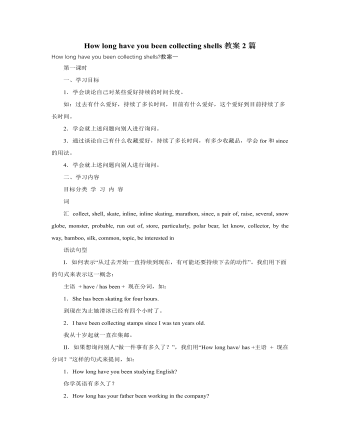
人教版新目标初中英语八年级下册How long have you been collecting shells教案2篇
Step Ⅱ Show the new words on the screen and teach the new words. Read the new words to students and ask them to repeat.Step Ⅲ 3aThis activity introduces new vocabulary and provides reading practice using the target language.In this activity first look at the four pictures.T: What can you see in the pictures?Ss: Four snow globes.T: Right. There are four snow globes in the pictures. And what are they?Ss: They are a monster, two polar bears, two penguins and a birthday cake.Write these words on the blackboard: snow globe; monster; polar bear; penguin and birthday cake. Read them to the class and ask students to repeat each one. Make sure students understand each word.Use a computer to show the E-mail message on the screen and read the message to students.Get students to read the e-mail on their own, and then draw lines connecting each snow globe and its description.Correct the answers.AnswersA line should connect each snow globe picture with the words that describe it in the letter.Step Ⅳ 3bThis activity provides writing practice using the target language.First review Activity 2a on Page 47.Then ask students to complete the message according to Activity 2a.Some partial sentences are given to students. Write about one person's collection.When students work, walk around the room checking the progress and offering help as needed.When they finish, ask some students to read their messages to the class.

人教版新目标初中英语八年级下册What were you doing when the UFO arrived教案2篇
(一).知识方面: 1.培养学生能运用过去进行时来描述、谈论过去某个时间正在发生的事情或动作的意识和能力,能就过去某个时间正在发生的动作做出正确的描述。 2.培养学生的想象力和角色扮演的合作能力。 3.培养学生讲述过去发生的事情经过的能力。能正确运用一般过去时来讲述故事。 (二).技能方面: 1.本单元的语言目标是Talk about past events and tell a story(谈论过去的时间和讲述一个故事),围绕这一目标,要涉及句型: What were you doing when the UFO arrived? ----I was sitting in the barber’s chair. The barber was cutting my hair. 因此必须学习standing、studying、cleaning、sleeping、cooking、making、eating、cutting、等表示地点的词,以便为上述句型提供语言材料。2.学习过去进行时的有关知识。Was/were+现在分词,是该时态的表达式。 3.在学习过程中,要区分The boy was walking down the street when the UFO landed.和While the boy was walking down the street, the UFO landed.这两种由when和while引导的状语从句的句型结构。注意它们的不同。
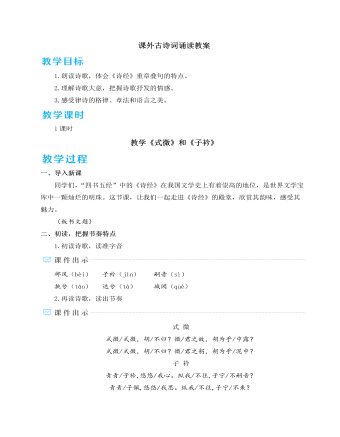
人教部编版语文八年级下册课外古诗词诵读教案
预设 “海内存知己,天涯若比邻”一反送别诗伤感悲戚的格调,体现出高远的志趣和旷达的胸怀,表明诚挚的友谊可以超越时空。此句蕴含哲理,给人以莫大的安慰和鼓舞,因此成为远隔千里的朋友间表达深情厚谊的名句。设问3:“气蒸云梦泽,波撼岳阳城”中的“蒸”和“撼”换成“滋”和“摇”好不好?为什么?预设 不好。“蒸”是蒸腾的意思,形象地描绘了洞庭湖雾气蒸腾、湖面浩渺的画面;“撼”是摇撼的意思,描绘出了洞庭湖波涛汹涌似要撼动岳阳城的雄伟壮阔的景象,且“撼”还能传达出诗人面对湖水时心胸似乎也被震荡,从而想要建功立业的主观感受。如果换成“滋”和“摇”则显得境界小、力度弱,没有这样的气势和表达效果。【设计意图】此环节主要采用问题引领的方式,一步步引导学生品味诗歌中的名句和富有表现力的字词,感受古人炼字的智慧,从而更加深入地理解诗歌情感和艺术手法。
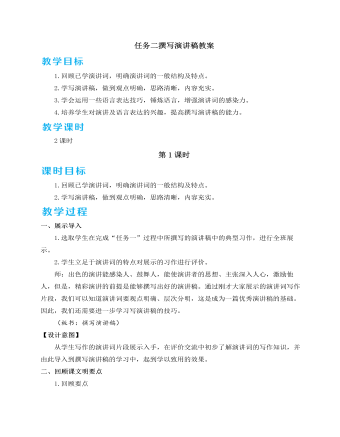
人教部编版语文八年级下册任务二撰写演讲稿教案
[乙]爱是人世间最完美的一种情感,爱就像一缕冬日里的阳光,能让饥寒交迫的人感到温暖;爱就像一泓沙漠中的清泉,能使濒临绝境的人看到希望;爱就像一盏黑暗中的路灯,能让迷惘的人找到方向。我们要让爱永驻心中,哪怕只是对父母的一句“我爱你们”、对朋友的一句“加油”、对摔倒老人的一次伸手。多一份行动,多一份传递,多一种信念,尽自己的微薄之力去帮助他人,回报社会,让爱的种子飞得更远更广,永远地扎根于人们的心中!(生交流讨论)预设 乙结尾运用了比喻、排比等修辞手法,语言更加生动,富于表现力,尤其是排比句的运用,使得句式整齐、有气势,情感表达有感染力。另外,结尾段不断重申观点,也起到了加深听众印象的效果。师:除了运用修辞手法之外,根据演讲稿的特点,我们还可以从哪些方面锤炼语言来增强演讲的表达效果呢?(生结合演讲稿的特点,讨论交流)预设 (1)运用一些口语、大众化的语言,拉近与听众的距离。(2)多用短句,少用结构复杂的长句,使语意清晰,简短易懂。





